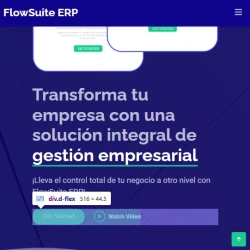
ERP
In a business world where efficiency and adaptability are essential for success, technological tools play a crucial role. Among them, enterprise resource planning systems, better known as ERP (Enterprise Resource Planning), have become a necessity for organizations looking to improve their operational management and make more informed decisions.
What is an ERP and why is it essential?
An ERP is a software designed to integrate the different processes of a company into a single platform. From inventory management to financial control, through human resources, sales and customer service, an ERP allows all these areas to work in synchrony.
The main advantage of an ERP system is its ability to unify data and processes in real time, which eliminates information silos and improves collaboration between departments. This translates into greater operational efficiency, reduced errors, and a comprehensive view of the company's status.
Benefits of Implementing an ERP
1. Process Optimization
An ERP automates repetitive tasks and simplifies complex workflows. This not only reduces the time and effort required to perform certain activities, but also allows employees to focus on strategic tasks.
2. Data-Driven Decision Making
With an ERP, data from across the company is centralized and updated in real time. This makes it easier to access key information, such as financial reports, performance metrics, and market trends, allowing for faster, more accurate decisions.
3. Improved Customer Experience
By integrating a CRM module within the ERP, companies can better manage their interactions with customers, offering faster and more personalized responses. This translates into greater satisfaction and loyalty.
4. Scalability
An ERP is designed to grow with your business. Whether you're expanding operations, opening new branches, or entering new markets, the software can adapt and scale to meet your company's changing needs.
5. Regulatory Compliance and Security
Many ERP systems include tools to ensure your company complies with local and international regulations in areas such as accounting, taxes, and data management. They also have advanced security measures to protect the organization's sensitive information.
Who Can Benefit from an ERP?
Contrary to the belief that an ERP is only for large corporations, this type of software is just as valuable for small and medium-sized businesses (SMEs). In SMEs, an ERP can make a difference by optimizing limited resources and offering more precise control of daily operations.
Sectors such as manufacturing, retail, healthcare, logistics, and professional services find an ERP to be an indispensable tool to stay competitive in an increasingly digitalized environment.
How to Choose the Right ERP for Your Business?
Selecting an ERP is not a decision that should be taken lightly. Some key factors to consider include:
- Specific requirements: Analyze the needs of your business and prioritize the modules that you will actually use.
- Scalability: Make sure the system can grow with your company.
- Ease of use: Opt for intuitive software that does not require a steep learning curve.
- Technical support: It is essential to have a provider that offers 24/7 support and constant updates.
Nowadays, implementing ERP software is no longer a luxury, but a strategic necessity. This type of solution not only optimizes processes and improves productivity, but also provides a solid foundation for companies to be more competitive in a globalized market.
Adopting an ERP may seem like a big step, but the benefits it brings make the investment worthwhile. If your goal is to consolidate your operation, make decisions based on data and be prepared for the challenges of the future, an ERP system is the tool you need.

